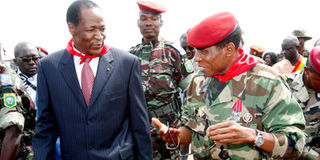Guinean tycoon pulls out of coalition

Blaise Compaore (left), Burkina Faso's president and long-time regional crisis mediator, talks to Captain Moussa Dadis Camara, chief of the ruling junta in Guinea, as he arrives at the international airport in Conakry October 5, 2009. REUTERS
Guinean tycoon and emblematic opposition figure, El Hadj Mamadou Sylla, has withdrawn from the country’s majority political coalition, as the politico-military countdown gathers steam in the turbulent French-speaking West African country.
In a statement read on his behalf by a party stalwart on Monday evening, Mr Sylla said he was officially resigning from the political outfit “due to the lack of cohesion and misunderstanding” within the coalition.
Mr Sylla who is the leader of the Democratic Union of Guinea or UDG, further explained that he was quitting the opposition coalition known as “Forces Vives” to launch a centrist political bloc in the capital, Conakry.
The “Forces Vives” which comprises of about 10 opposition political parties, also enjoys the support of the country’s vibrant civil society and trade union organisations.
Mr Sylla’s statement of withdrawal was read at his party’s headquarters in the presence of several senior opposition party leaders including Mamadou Bhoye Barry, a candidate in the 2003 presidential elections and Ousmane Bah the president of the Union for Progress and Renewal.
In the statement, Mr Sylla said the UDG had been subjected to frustration due to the party’s exclusion from several decision-making processes by the coalition on the grounds that the UDG leadership was conniving with the ruling junta regime.
It can be recalled that at the opening of the Inter-Guinean dialogue in the Burkinabe capital Ouagadougou last month, the UDG was deleted from the list of parties to take part in the talks with the Burkina President who is the mediator in the Guinean crisis.
The other prominent persons who were excluded from the talks include former Guinean Prime Minister and chairman of the Hope for National Development party, Mr Lansana Kouyate, as well as Mr Mouctar Diallo of the New Democratic Forces, Mamadi Diawara of the Labour and Solidarity Party and several other trade unionists and civil society representatives.
Politico-military dialogue
Before joining politics, El Hadj Mamadou Sylla was a trader and crony of former Guinean dictator and Head of State, General Lansana Conte who died in December 2008 from a long illness in Conakry.
Mr Sylla was imprisoned by the Conte regime for embezzling cash bonds at the Central Bank of Guinea, but was freed the following day by his friend, Mr Conte.
Meanwhile, a stalemate persists in the ongoing politico-military dialogue being mediated by Burkina President, Blaise Compaoré over the setting up of a transitional government that could pave the way for democratic elections hopefully before the end of 2010.
The stalemate stems from the fact that the opposition coalition is insisting that the junta leader instantly abdicates power without any preconditions and should not be eligible to contest the polls.
But the mediator, following weeks of consultations with the local politicians, regional leaders as well as with the international community, had appealed to the opposition to accept that Capt Moussa Dadis Camara leads the interim government of national unity and should be allowed to contest the elections as the only way forward and out of the crisis.
The junta heartily acclaimed the decision while the opposition Forces Vives branded it as unfair and totally unacceptable.
On Monday night, the junta proceeded with arrest and detention of Mr Mouctar Diallo of the New Democratic Forces for allegedly granting an interview to the foreign press and during which he castigated the junta for its iron-fisted massacre of civilian protesters on September 28.
On that fateful day, as estimated 157 unarmed civilian protesters were killed in Conakry by uniformed men allegedly belonging to the junta presidential guard while scores of women and girls were assaulted and raped.
An international investigation commission set up by the UN Secretary-General is presently pursuing inquiries with the view to identify those responsible for the mayhem and would eventually be brought to justice. The commission ends its findings on December 4, and will instantly report back to Mr Ban Ki-Moon.




